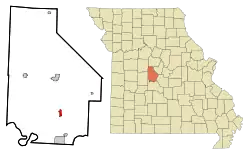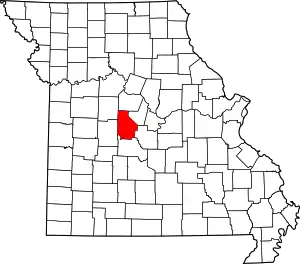Gravois Mills, Missouri
Gravois Mills is a village in Morgan County, Missouri, United States. The population was 144 at the 2010 census.
Gravois Mills, Missouri | |
|---|---|
| Village of Gravois Mills | |
 Location of Gravois Mills, Missouri | |
| Coordinates: 38°18′30″N 92°49′32″W[1] | |
| Country | United States |
| State | Missouri |
| County | Morgan |
| Area | |
| • Total | 0.82 sq mi (2.13 km2) |
| • Land | 0.74 sq mi (1.92 km2) |
| • Water | 0.08 sq mi (0.21 km2) |
| Elevation | 682 ft (208 m) |
| Population | |
| • Total | 144 |
| • Estimate (2019)[4] | 148 |
| • Density | 199.46/sq mi (76.99/km2) |
| Time zone | UTC-6 (Central (CST)) |
| • Summer (DST) | UTC-5 (CDT) |
| ZIP codes | 65037-65038 |
| Area code(s) | 573 |
| FIPS code | 29-28828[5] |
History
Gravois Mills was laid out in 1884, and named for a nearby gristmill on Gravois Creek.[6] A post office called Gravois Mills has been in operation since 1860.[7]
Old St. Patrick's Church was listed on the National Register of Historic Places in 1979.[8]
Geography
Gravois Mills is located on the upper end of the Gravois Creek arm of the Lake of the Ozarks and Missouri Route 5. Versailles is about seven miles north and Sunrise Beach is approximately ten miles to the south along Route 5.[9]
According to the United States Census Bureau, the village has a total area of 0.82 square miles (2.12 km2), of which 0.74 square miles (1.92 km2) is land and 0.08 square miles (0.21 km2) is water.[10]
Demographics
| Historical population | |||
|---|---|---|---|
| Census | Pop. | %± | |
| 1960 | 33 | — | |
| 1970 | 34 | 3.0% | |
| 1980 | 101 | 197.1% | |
| 1990 | 101 | 0.0% | |
| 2000 | 208 | 105.9% | |
| 2010 | 144 | −30.8% | |
| 2019 (est.) | 148 | [4] | 2.8% |
| U.S. Decennial Census[11] | |||
2010 census
As of the census[3] of 2010, there were 144 people, 59 households, and 33 families residing in the village. The population density was 194.6 inhabitants per square mile (75.1/km2). There were 108 housing units at an average density of 145.9 per square mile (56.3/km2). The racial makeup of the village was 93.1% White, 1.4% African American, 1.4% Native American, 0.7% from other races, and 3.5% from two or more races. Hispanic or Latino of any race were 4.9% of the population.
There were 59 households, of which 25.4% had children under the age of 18 living with them, 44.1% were married couples living together, 8.5% had a female householder with no husband present, 3.4% had a male householder with no wife present, and 44.1% were non-families. 33.9% of all households were made up of individuals, and 15.3% had someone living alone who was 65 years of age or older. The average household size was 2.44 and the average family size was 3.12.
The median age in the village was 46 years. 21.5% of residents were under the age of 18; 8.4% were between the ages of 18 and 24; 18.8% were from 25 to 44; 31.2% were from 45 to 64; and 20.1% were 65 years of age or older. The gender makeup of the village was 48.6% male and 51.4% female.
2000 census
As of the census[5] of 2000, there were 208 people, 101 households, and 56 families residing in the town. The population density was 268.4 people per square mile (103.0/km2). There were 144 housing units at an average density of 185.8 per square mile (71.3/km2). The racial makeup of the town was 98.56% White, 0.96% African American, and 0.48% from two or more races.
There were 101 households, out of which 22.8% had children under the age of 18 living with them, 39.6% were married couples living together, 10.9% had a female householder with no husband present, and 43.6% were non-families. 36.6% of all households were made up of individuals, and 9.9% had someone living alone who was 65 years of age or older. The average household size was 2.06 and the average family size was 2.68.
In the town the population was spread out, with 22.1% under the age of 18, 8.7% from 18 to 24, 21.6% from 25 to 44, 28.4% from 45 to 64, and 19.2% who were 65 years of age or older. The median age was 44 years. For every 100 females, there were 92.6 males. For every 100 females age 18 and over, there were 80.0 males.
The median income for a household in the town was $24,167, and the median income for a family was $28,750. Males had a median income of $21,250 versus $12,917 for females. The per capita income for the town was $13,060. About 24.1% of families and 26.0% of the population were below the poverty line, including 69.8% of those under the age of eighteen and 10.0% of those 65 or over.
References
- U.S. Geological Survey Geographic Names Information System: Gravois Mills, Missouri
- "2019 U.S. Gazetteer Files". United States Census Bureau. Retrieved July 26, 2020.
- "U.S. Census website". United States Census Bureau. Retrieved 2012-07-08.
- "Population and Housing Unit Estimates". United States Census Bureau. May 24, 2020. Retrieved May 27, 2020.
- "U.S. Census website". United States Census Bureau. Retrieved 2008-01-31.
- "Morgan County Place Names, 1928–1945". The State Historical Society of Missouri. Archived from the original on June 24, 2016. Retrieved November 17, 2016.
- "Post Offices". Jim Forte Postal History. Retrieved 17 November 2016.
- "National Register Information System". National Register of Historic Places. National Park Service. July 9, 2010.
- Missouri Atlas & Gazetteer, DeLorme, 1998, First edition, p. 45, ISBN 0-89933-224-2
- "US Gazetteer files 2010". United States Census Bureau. Archived from the original on 2012-01-25. Retrieved 2012-07-08.
- "Census of Population and Housing". Census.gov. Retrieved June 4, 2015.
